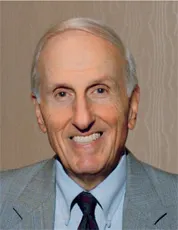Alexander Polikoff, ’53: Inspiring Social Change through Legal Action

In 1966, Alexander Polikoff, ’53, and a team of lawyers brought America’s first major public housing desegregation lawsuit, Gautreaux v. Chicago Housing Authority, challenging CHA’s practices for siting its housing projects. In a companion suit, Polikoff and his team demanded that the US Department of Housing and Urban Development stop funding CHA’s unlawful practices.Three years later the consolidated case was decided in the plaintiffs’ favor in a federal district court, and in 1976 a landmark ruling by the US Supreme Court—before which Polikoff had presented his clients’ oral argument—cleared the way for what the Court described as “a comprehensive metropolitan area plan that will not only disestablish the segregated public housing system in the City of Chicago . . . but will increase the supply of dwelling units as rapidly as possible.”
Today, Polikoff is still actively leading the continuing implementation of Gautreaux. He documented many of the twists and turns of that case in his 2006 book, Waiting for Gautreaux. One remedy adopted as a result of Gautreaux—the use of housing subsidies and other strategies to provide tenants broader options for where they may choose to live throughout a metropolitan area—has now been adopted in various forms in 33 locations around the United States.
When he first led the launch of the Gautreaux suit, Polikoff was working pro bono at the ACLU while a partner at Schiff Hardin, where he had been since graduation. In 1970, he became executive director of the Chicago-based law and policy center Business and Professional People for the Public Interest (BPI); he held that position until 1999, and he is still at BPI today as the director of its public housing program.
Under Polikoff’s leadership, BPI’s accomplishments extended beyond housing issues to include preventing the construction of a nuclear power plant adjacent to the Indiana Dunes, winning the largest utility refund in US history from Commonwealth Edison, and securing the adoption by the Chicago Public School Board of a formal resolution supporting the creation of small schools. He is the principal author of BPI’s recent study of the role of inspectors general in combating government corruption and a major contributor to BPI’s 2011 report on a successful, innovative approach for increasing public school effectiveness. BPI’s Polikoff-Gautreaux Fellowship, aimed at helping young attorneys learn how to go beyond traditional legal remedies to bring about social change, attracted more than 200 applicants last year. His new book, The Path Still Open, argues that there is still time to bring peace and justice to the world through the use of “cooperative power.”
Polikoff, who also earned bachelor’s and master’s degrees from the University of Chicago, credits the Law School for fostering his commitment to public interest law: “I was blessed, as so many succeeding generations have been, by a great faculty at an institution wholeheartedly committed to engaging with the problems of the real world. Harry Kalven in particular, but the entire law school experience in general, were absolutely central to getting me involved.” He says that a galvanizing event for him occurred during his first year, when he worked with Kalven, Abner Mikva, ’52, and others on an ACLU brief on behalf of George Anastaplo, ’51, who was denied admission to the Illinois bar after refusing to answer the question, “Are you now or have you ever been a member of the Communist Party?”
Reflecting on the civil rights ferment in Chicago in the 1960s and 1970s, the Pulitzer Prize–winning columnist Clarence Page observed, “From my perspective, the activists who had the most impact on the lives of low-income black families may well have been Alex Polikoff and the rest of his pro bono team of lawyers.”
And Page saw more in Polikoff’s work than legal victories; he saw an inspiring example of the potential scope of public-interest activism. “As Polikoff battled all the way to the Supreme Court,” Page wrote, “he showed us that dedicated public-interest lawyers could beat [not just City Hall but] the White House, too. They could change the nation’s housing policy, and, more important, change lives.” Ultimately, changing housing policy became only one of the many ways in which Alexander Polikoff has changed lives.


